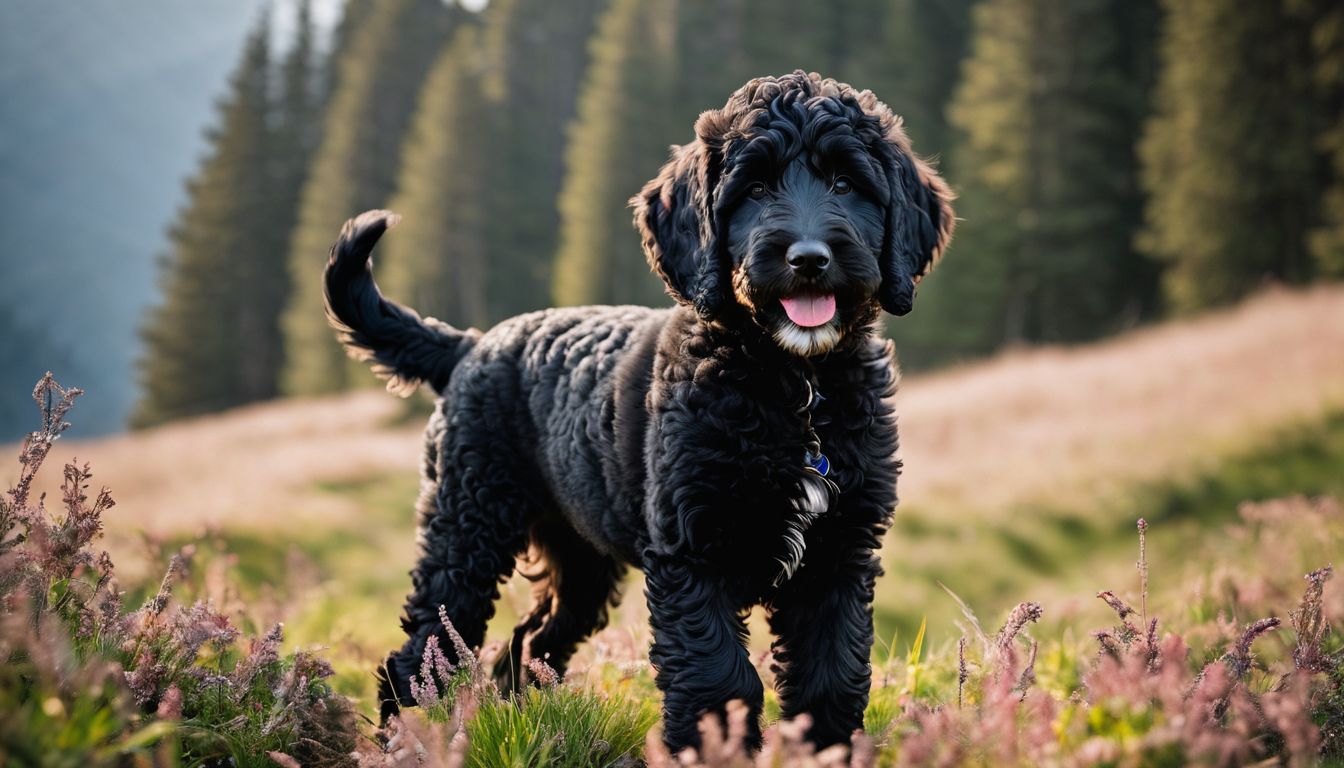Have you noticed why is my black doodle turning grey?? This transformation, known as progressive graying, is a common occurrence in the Goldendoodle breed. In this article, we will delve into why and how this color shift occurs, exploring factors like genetics, age changes to the coat and more.
Stay with us to learn about this fascinating aspect of your adorable Doodle’s life!
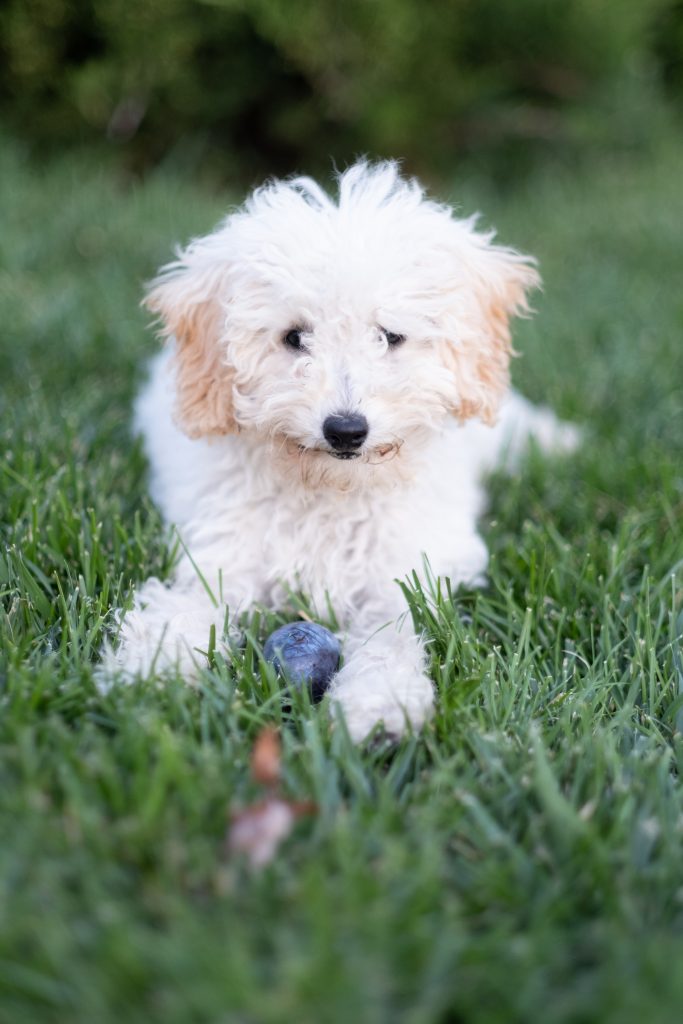
Key Takeaways
- Goldendoodle coats can change color due to a mix of genetics from their Golden Retriever and Poodle parents, hormonal imbalances, weather and diet factors, as well as stains and dirt.
- Hormonal imbalances can affect the production and distribution of melanin in your Goldendoodle’s coat, causing it to lighten or change shades over time.
- Extreme temperatures and a poor diet lacking essential nutrients can also influence the color changes in your Goldendoodle’s coat.
- Stains from substances like mud or grass, as well as regular grooming and bathing practices, can impact the appearance of your Goldendoodle’s coat color.
Why Do Goldendoodle Coats Change Color?
Goldendoodle coats can change color due to a combination of genetics from their Golden Retriever and Poodle parents, hormonal imbalances, weather and diet factors, as well as stains and dirt.
Genetics (Golden Retriever and Poodle parents)
Goldendoodles get their looks from two breeds. Those are the Golden Retriever and the Poodle. The coat of a Goldendoodle can change because of this mix. Black Doodles may turn grey over time.
This is common in black Poodles too. This change often happens in the first one or two years of their life. Some areas may keep their color while others lose it. This fact shows us how strong genes can be.
Hormonal imbalances
Hormonal imbalances can also play a role in the changing coat color of your Goldendoodle. Hormones are chemical messengers that regulate various processes in the body, including pigmentation.
If there is an imbalance in hormone levels, it can affect the production and distribution of melanin, which is responsible for hair color. This imbalance can cause the black fur of your Goldendoodle to lighten or change shades over time.
It’s important to note that hormonal imbalances can be caused by various factors, such as certain medications or underlying health conditions.
Weather and diet
Changes in a Goldendoodle’s coat color can also be influenced by the weather and their diet. Extreme temperatures, such as excessive heat or cold, may cause the fur to lighten or darken.
Additionally, a poor diet lacking essential nutrients can affect the pigmentation of their coat, leading to color changes over time. It is important to provide your Goldendoodle with a balanced and nutritious diet that supports healthy coat development.
Stains and dirt
Stains and dirt can also affect the color of your Goldendoodle’s coat. When your dog plays outside or rolls around in the grass, they can pick up stains from various substances like mud, grass, or even urine.
These stains can cause discoloration and make their coat appear different shades than it actually is. Regular grooming and bathing can help remove these stains and keep your Goldendoodle’s coat looking clean and vibrant.
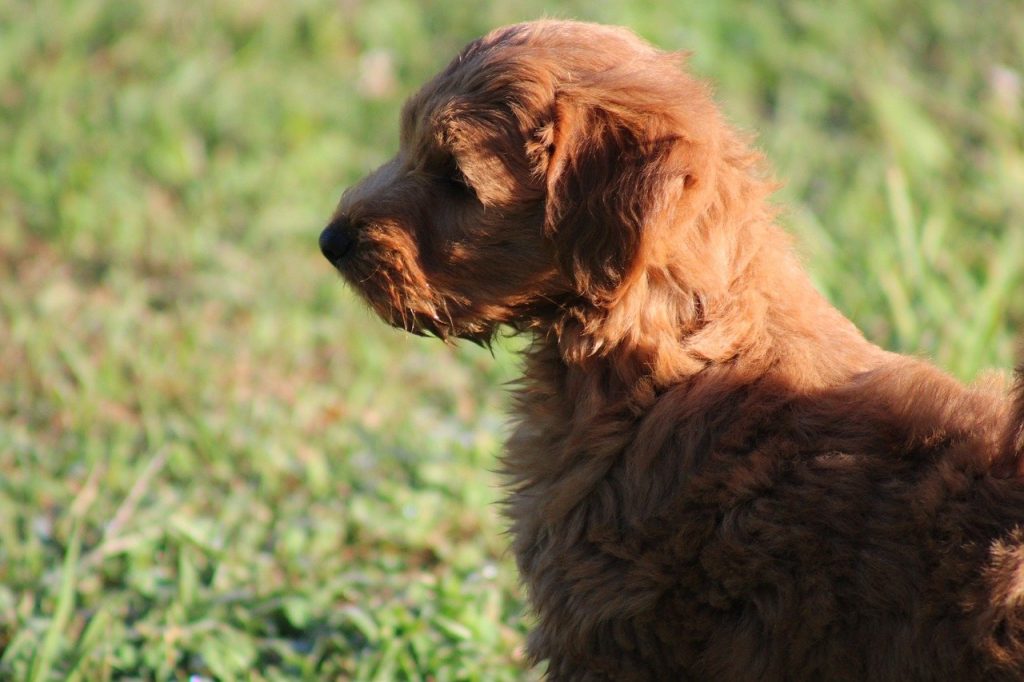
Common Reasons for Goldendoodle Coat Color Changes
There are several common reasons why Goldendoodle coat colors may change, including nutritional deficiencies, skin injuries, medication, and vitiligo. Find out more about these factors and how they can affect your doodle’s coat color in our blog post!
Nutritional deficiencies
Nutritional deficiencies can also play a role in the change of your Goldendoodle’s coat color. If your dog doesn’t get enough essential vitamins and minerals from their diet, it can affect the health of their fur.
For example, a lack of certain nutrients like zinc or copper may lead to changes in pigmentation or even hair loss in some cases.
Skin injuries
Skin injuries can also contribute to changes in your Goldendoodle’s coat color. If your dog gets a cut or scrape, it can cause hair to grow back differently and possibly change in color.
This is because the skin heals itself, and sometimes the new hair that grows back may be a different shade than before. So, if you notice any skin injuries on your Goldendoodle, don’t be surprised if their coat color changes as a result.
Medication
Sometimes, changes in a Goldendoodle’s coat color can be influenced by medication. Certain medications can have an impact on the pigmentation of their fur, resulting in color variations or fading.
This is more common with long-term use of certain medications. If you notice any changes in your Goldendoodle’s coat color while they are taking medication, it’s important to discuss this with your veterinarian to understand if it is a temporary effect or something that needs further attention.
Vitiligo
Vitiligo is a condition that can affect Goldendoodles and cause changes in their coat color. It happens when the cells that produce pigment in the skin stop working properly. This can result in patches of white or lighter-colored fur on your Goldendoodle’s body.
While vitiligo is not harmful or painful for your dog, it can be noticeable and may become more apparent as they age. The exact cause of vitiligo is unknown, but it is believed to have a genetic component.
If you notice any changes in your Goldendoodle’s coat color, it’s always a good idea to consult with your veterinarian to rule out any underlying health issues.
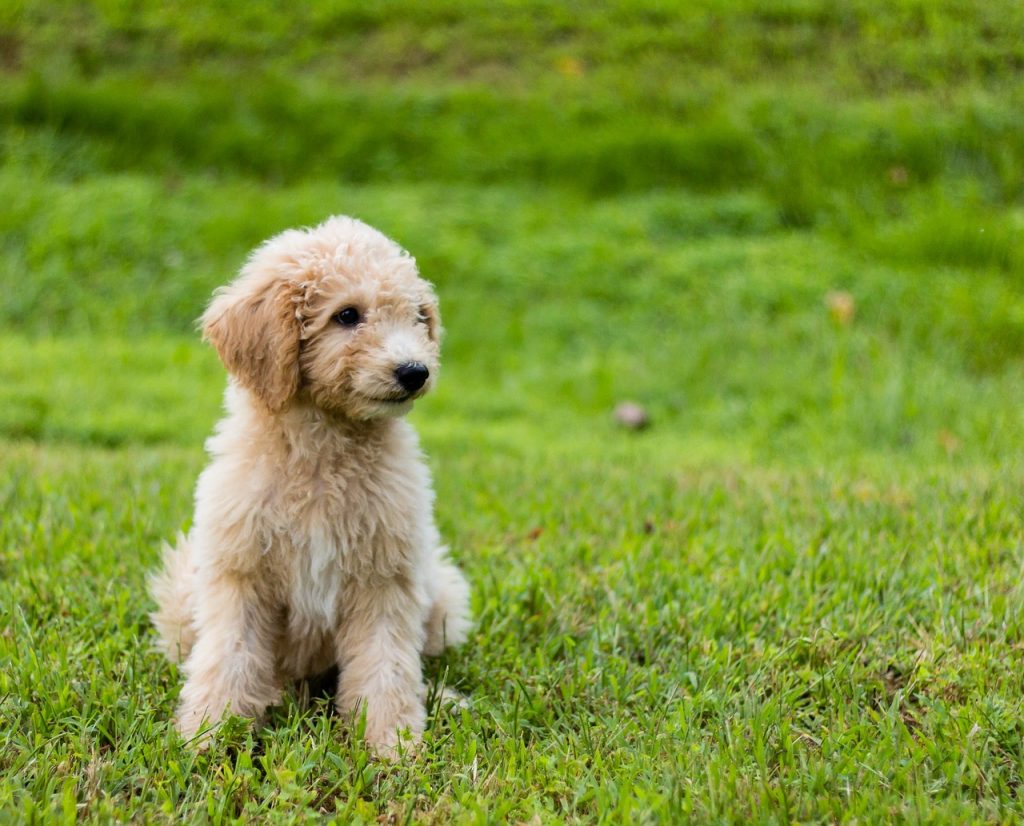
When Do Goldendoodle Coats Change Color?
Goldendoodle coats undergo color changes during the transition from puppy to adult coat, as well as throughout their lives due to age-related factors and the effects of neutering or spaying.
Puppy to adult coat transition
As your Goldendoodle puppy grows into adulthood, you may notice changes in their coat color. This transition is a natural process and can vary from dog to dog. While some puppies may maintain their original coat color, others may experience a lightening or darkening of their fur.
For example, a black Goldendoodle puppy might develop a blue or gray coat as they lose their puppy fur. The process of the coat changing from black to another color is called “fading black” and typically occurs over the first year or two of the dog’s life.
It’s important to understand that these color changes are normal and part of your Goldendoodle’s unique journey into adulthood.
As Goldendoodles get older, their coat colors can change. This is known as age-related color changes. It’s a natural process that occurs in many dogs, including Goldendoodles.
So if your Goldendoodle started out with a black or dark-colored coat, don’t be surprised if it starts to lighten up and turn gray or silver as it gets older. It’s just part of the aging process and doesn’t necessarily indicate any health issues.
Effects of neutering/spaying
Neutering or spaying your Goldendoodle can potentially affect their coat color. While neutering or spaying itself does not directly cause changes in coat color, the hormonal changes that occur after the procedure may impact their fur.
Hormones play a role in regulating pigmentation and melanin production in the hair follicles, so altering these hormone levels can lead to variations in coat color. However, it’s important to note that not all Goldendoodles will experience noticeable changes in their fur after being neutered or spayed.
What Can You Do to Preserve Your Goldendoodle’s Coat Color?
To keep your Goldendoodle’s coat color looking its best, work with a reputable breeder, understand coat colors and types, choose the right color for you, and provide proper grooming and nutrition.
Learn more about how to preserve your Goldendoodle’s coat color by reading the full article!
Work with a reputable breeder
It’s important to work with a reputable breeder when getting a Goldendoodle. A good breeder will carefully select the parent dogs and ensure they have a healthy genetic background.
This can help minimize the risks of coat color changes or health issues in your Goldendoodle. A reputable breeder will also provide you with information on the specific traits and characteristics of their puppies, including potential coat color changes as they grow older.
By working with a trusted breeder, you can have more confidence in the quality and predictability of your Goldendoodle’s coat color.
Buy a “true” Goldendoodle
When looking to buy a Goldendoodle, it’s important to choose a reputable breeder. This ensures that you are getting a “true” Goldendoodle with all the desired traits and characteristics.
Reputable breeders will have knowledge of the Golden Retriever and Poodle genes that influence coat color, allowing them to produce puppies with consistent and predictable colors. By buying from a trusted breeder, you can be confident in the quality and authenticity of your Goldendoodle.
Understanding coat colors and types
Goldendoodles come in a variety of coat colors, including black, blue, gray, silver, and more. The coat color of your Goldendoodle can change as they grow older due to genetic factors and the influence of hormones.
Poodles, which are one part of the Goldendoodle mix, can also have their coat color change over time. It’s important to understand that the process of a black Goldendoodle’s fur changing color is natural and not something to be worried about.
By knowing the different coat colors and types that Goldendoodles can have, you can better appreciate the unique beauty of your furry friend.
Choosing the right color for you
When it comes to choosing the right color for your Goldendoodle, there are a few things to consider. First, think about what type of Goldendoodle you want – do you prefer a black one that might eventually fade to gray or silver? Or maybe you like the idea of a blue or gray coat from the start.
Keep in mind that some Goldendoodles may keep their original color in certain areas while losing it in others as they grow older. It’s also important to work with a reputable breeder who can help guide you towards finding the right color and coat type for your preferences.
Lastly, don’t forget about proper grooming and nutrition to maintain your Goldendoodle’s coat color and health.
Proper grooming and nutrition
To help preserve your Goldendoodle’s coat color, it’s important to practice proper grooming and provide a nutritious diet. Regular brushing helps remove loose fur and prevent matting, which can affect the appearance of the coat.
Additionally, keeping your Goldendoodle clean by bathing them when necessary will help maintain their natural color. When it comes to nutrition, feeding your dog a balanced diet that includes high-quality protein and essential vitamins and minerals is crucial for healthy hair growth.
It’s also important to consult with your veterinarian regarding any specific dietary needs or supplements that may benefit your Goldendoodle’s coat health.
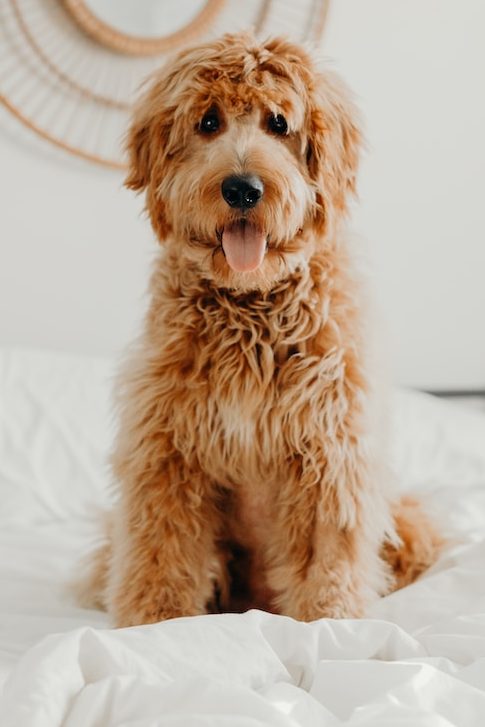
Conclusion
In conclusion, it’s not uncommon for a black Goldendoodle to change shades and become gray or silver as they age. This color change is influenced by genetics, hormonal imbalances, weather and diet, stains and dirt.
By understanding the factors that affect coat color and taking proper care of your Goldendoodle, you can help preserve their beautiful fur for years to come.
FAQs
1. Why is my black Goldendoodle turning grey?
Your black Goldendoodle might be turning gray due to a natural process of color change, often caused by aging and melanin reduction in the fur.
2. How do Poodle genes affect my doodle’s coat color?
Poodle genes inherited by your doodle may lead to different coat colors such as blue or grey, known as progressive graying in Goldendoodles.
3. Is it normal for a Goldendoodle puppy’s coat to change from black to gray?
Yes, it is completely normal. A puppy’s transition from their soft fluffy baby coat to the mature one can cause lightening of black Goldendoodle fur and even develop into gray color.
4. What factors affect my Doodles’ changing hair shades?
Aging changes, genetic variations, pigmentation changes are all key factors affecting why your doodles’ fur goes through this color shifting process and they are part of the natural doodle coat evolution.
5. Will my Doodles’ grey hair turn back to its original color?
No, once your Doodles’ hair turns grey because of aging or other factors like melanin reduction it doesn’t go back to its original shade.
6. Does the price differ between Black and Grey Goldendoodles?
The price doesn’t depend on whether your dog has a black or grey coat; instead things like Golden Retriever-Poodle combination and specific traits decide how much you pay for your pup!


